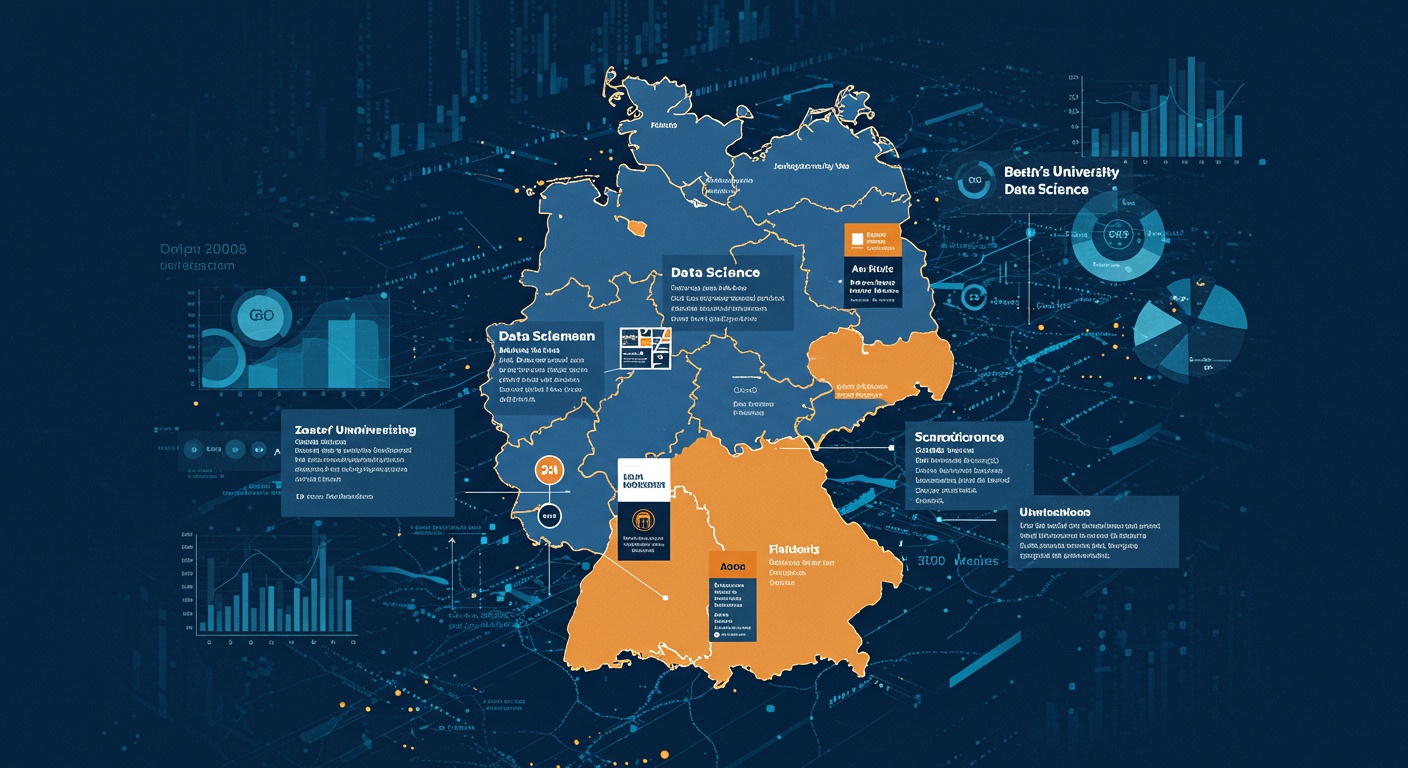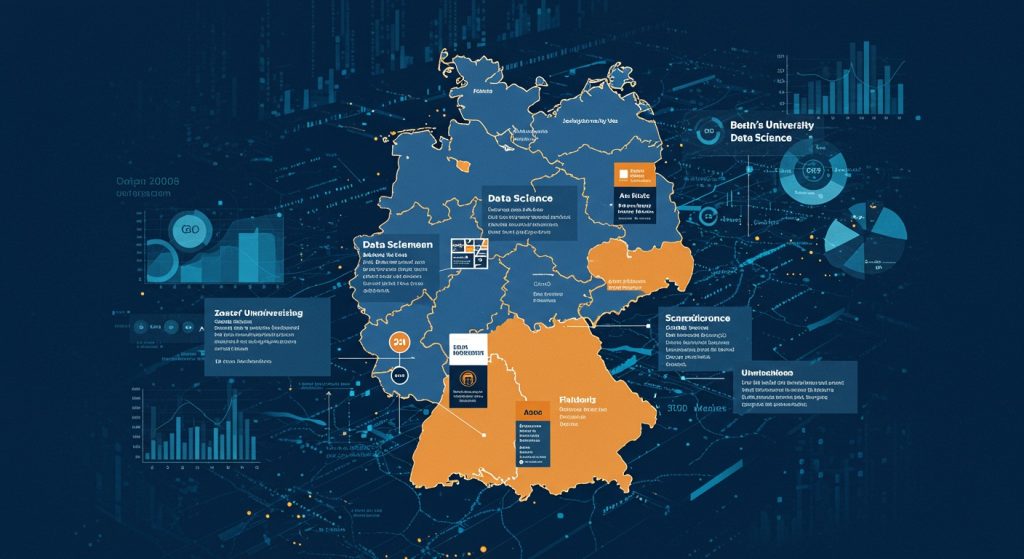Germany is rapidly becoming a global powerhouse in data science, fueled by its strong engineering tradition and burgeoning AI ecosystem. The demand for skilled data scientists is surging, especially with the rise of Industry 4. 0 and the increasing reliance on data-driven decision-making across sectors like automotive, manufacturing. Healthcare. This creates a compelling landscape for pursuing a Master’s in Data Science. But navigating the German university system can be complex. To equip you with the knowledge to make an informed decision, we will explore top-tier programs that emphasize cutting-edge methodologies, hands-on experience with real-world datasets. Strong industry connections, ensuring you’re prepared to tackle the data challenges of tomorrow.

Understanding Data Science: A Primer
Before diving into the best universities, let’s establish a common understanding of what Data Science entails. At its core, Data Science is an interdisciplinary field that uses scientific methods, processes, algorithms. Systems to extract knowledge and insights from structured and unstructured data. It’s a blend of statistics, computer science. Domain expertise.
Key technologies and concepts involved include:
- Machine Learning (ML): Algorithms that allow computers to learn from data without explicit programming. Examples include linear regression, decision trees. Neural networks.
- Deep Learning: A subset of machine learning that uses artificial neural networks with multiple layers to examine data.
- Data Mining: Discovering patterns and insights from large datasets.
- Big Data: Handling and processing extremely large and complex datasets that traditional methods can’t manage. Technologies like Hadoop and Spark are often used.
- Statistical Analysis: Using statistical methods to assess data, draw inferences. Make predictions.
- Data Visualization: Presenting data in a graphical format to make it easier to interpret. Tools like Tableau and Power BI are popular.
- Programming Languages: Python and R are the dominant languages in Data Science due to their extensive libraries and frameworks.
Real-World Application: Consider a retail company using Data Science to assess customer purchase history. By applying machine learning algorithms, they can identify patterns, predict future purchases. Personalize marketing campaigns, leading to increased sales and customer satisfaction.
Why Study Data Science in Germany?
Germany has emerged as a prominent hub for Data Science education and research, attracting students from around the globe. Several factors contribute to this popularity:
- Strong Academic Reputation: German universities are renowned for their rigorous academic standards, research-oriented approach. Excellent faculty.
- Industry Collaboration: Many universities have strong ties with industry partners, providing students with opportunities for internships, research projects. Job placements.
- Affordable Education: Compared to other Western countries, tuition fees in Germany are relatively low, especially at public universities.
- Growing Job Market: The demand for Data Scientists is rapidly increasing in Germany across various sectors, including automotive, finance, healthcare. Manufacturing.
- International Environment: Germany is a multicultural country with a large international student population, providing a vibrant and welcoming environment for students from all backgrounds.
Top Universities for Master’s in Data Science
Selecting the “best” university is subjective and depends on your individual needs and preferences. But, here’s a list of highly regarded universities in Germany offering excellent Master’s programs in Data Science or related fields:
- Technical University of Munich (TUM): TUM offers a Master’s in Data Engineering and Analytics. It is consistently ranked among the top universities in Germany and globally. The program emphasizes both theoretical foundations and practical applications of Data Science. TUM has strong links with industry and provides excellent research opportunities.
- Ludwig Maximilian University of Munich (LMU): LMU offers a Master’s in Statistics and Data Science. This program focuses on statistical modeling, machine learning. Data analysis. LMU is another prestigious university in Munich with a strong reputation in mathematics and statistics.
- RWTH Aachen University: RWTH Aachen offers a Master’s in Data Science. This program is interdisciplinary, combining computer science, mathematics. Engineering. RWTH Aachen is known for its engineering programs and has a strong focus on practical applications.
- Humboldt University of Berlin: Humboldt University offers a Master’s in Data Science. This program is research-oriented and focuses on the theoretical foundations of Data Science. Humboldt University is one of the oldest and most prestigious universities in Berlin.
- University of Mannheim: The University of Mannheim offers a Master’s in Data Science. The program is highly quantitative and focuses on statistical modeling, machine learning. Data analysis. The University of Mannheim is known for its business and economics programs and has a strong focus on quantitative methods.
- University of Freiburg: The University of Freiburg offers a Master’s in Computer Science with a specialization in Data Science. This program provides a solid foundation in computer science with a focus on Data Science techniques.
- Karlsruhe Institute of Technology (KIT): KIT offers a Master’s in Informatics with a specialization in Data Science. This program emphasizes both theoretical and practical aspects of Data Science and includes topics such as machine learning, data mining. Big data analytics.
Comparing Key Programs
| University | Program Name | Focus | Language | Duration |
|---|---|---|---|---|
| TUM | Data Engineering and Analytics | Data Engineering, Machine Learning, Big Data | English | 2 years |
| LMU | Statistics and Data Science | Statistical Modeling, Machine Learning, Data Analysis | English | 2 years |
| RWTH Aachen | Data Science | Interdisciplinary (Computer Science, Math, Engineering) | English | 2 years |
| Humboldt University | Data Science | Theoretical Foundations, Research-Oriented | English | 2 years |
| University of Mannheim | Data Science | Statistical Modeling, Machine Learning, Quantitative Methods | English | 2 years |
| University of Freiburg | Computer Science (Data Science Specialization) | Computer Science Fundamentals, Data Science Techniques | English | 2 years |
| KIT | Informatics (Data Science Specialization) | Machine Learning, Data Mining, Big Data Analytics | English/German | 2 years |
Admission Requirements and Application Process
The admission requirements for Master’s programs in Data Science in Germany vary depending on the university and program. But, some common requirements include:
- Bachelor’s Degree: A bachelor’s degree in a related field, such as computer science, mathematics, statistics, or engineering.
- Academic Transcripts: Official transcripts from all previously attended universities.
- English Language Proficiency: Proof of English language proficiency, such as TOEFL or IELTS scores.
- Letters of Recommendation: Letters of recommendation from professors or employers who can attest to your academic abilities and potential.
- Statement of Purpose: A statement of purpose outlining your academic and professional goals and why you are interested in the program.
- GRE Scores (Optional): Some universities may require or recommend GRE scores.
The application process typically involves submitting an online application through the university’s website. Be sure to check the specific requirements and deadlines for each program you are interested in.
Personal Anecdote: When I applied to a Master’s program in Germany, I spent a significant amount of time crafting my statement of purpose. I highlighted my relevant experiences, explained my passion for Data Science. Clearly articulated my career aspirations. This effort paid off, as I believe it helped me stand out from other applicants.
Career Prospects for Data Science Graduates in Germany
Graduates with a Master’s degree in Data Science from a German university have excellent career prospects. The demand for Data Scientists is rapidly growing across various industries, including:
- Automotive: Developing autonomous driving systems and optimizing manufacturing processes.
- Finance: Detecting fraud, managing risk. Personalizing financial services.
- Healthcare: Improving patient outcomes, developing new treatments. Optimizing healthcare operations.
- Manufacturing: Optimizing production processes, predicting equipment failures. Improving quality control.
- E-commerce: Personalizing recommendations, optimizing pricing. Detecting fraud.
Common job titles for Data Science graduates include:
- Data Scientist
- Data Analyst
- Machine Learning Engineer
- Business Intelligence Analyst
- Data Engineer
Salaries for Data Science professionals in Germany are competitive, with entry-level salaries ranging from €45,000 to €60,000 per year. With experience, Data Scientists can earn significantly more.
Funding and Scholarships
Several funding and scholarship opportunities are available for international students pursuing a Master’s degree in Data Science in Germany. Some popular options include:
- DAAD Scholarships: The German Academic Exchange Service (DAAD) offers a variety of scholarships for international students.
- Deutschlandstipendium: The Deutschlandstipendium is a national scholarship program that provides financial support to outstanding students.
- University-Specific Scholarships: Many universities offer their own scholarships for international students.
- Private Foundations: Several private foundations in Germany offer scholarships for students pursuing studies in STEM fields.
It is crucial to research and apply for scholarships well in advance of your program start date.
Conclusion
Germany offers a fertile ground for aspiring data scientists. Selecting the right Master’s program is a pivotal first step. Remember, the most prestigious university isn’t necessarily the best fit for everyone. Consider your specific interests within data science, your desired learning style. The university’s research focus. Don’t be afraid to reach out to current students or alumni; their firsthand experiences can provide invaluable insights. Looking ahead, the demand for skilled data scientists will only continue to grow, particularly in areas like AI-driven healthcare and sustainable energy solutions. My personal advice? Embrace continuous learning. The field is constantly evolving. Staying curious is your key to long-term success. Take advantage of online courses, attend workshops. Actively participate in the data science community. Your journey begins now. With the right preparation and mindset, you’re poised to thrive in this exciting field.
More Articles
Affordable Data Science Degrees in Germany for Global Careers
Best Computer Science Programs in Germany for International Students
Leading Computer Science Programs In Canadian Universities
Top Engineering Universities Across Europe For International Students
FAQs
So, which German unis are, like, really good for a Data Science Master’s?
Alright, if you’re aiming high, you’ll want to check out places like LMU Munich, TU Munich (Technische Universität München). RWTH Aachen. They consistently rank well and have strong research programs. Also, don’t sleep on the University of Freiburg and Humboldt University of Berlin – they’re definitely in the mix too. It really depends what you’re looking for in terms of program focus and location!
What makes a university ‘good’ for Data Science anyway? Is it just rankings?
Good question! Rankings are a piece of the puzzle. Definitely not the whole thing. Look at things like the faculty’s research interests (are they doing cool stuff you’re into?) , the program’s curriculum (does it cover the skills employers actually want?). The university’s connections to industry (internship opportunities, research collaborations, etc.). Plus, think about things like the student-to-faculty ratio – smaller classes mean more personalized attention.
Are these programs taught in English, or do I need to brush up on my German?
Most Master’s in Data Science programs in Germany are taught in English, especially those at the top universities. But, knowing some German will definitely enrich your experience and make it easier to navigate daily life. It’s always a plus!
What kind of background do I need to get into these programs? Do I have to be a math whiz?
A strong quantitative background is essential. Think math, statistics, computer science, engineering, or a related field. You don’t need to be a math whiz. A solid foundation in calculus, linear algebra. Probability is crucial. Also, some programming experience (Python, R, etc.) will give you a serious leg up.
How much does it cost to study Data Science in Germany? Is it really free?
Tuition fees at public universities in Germany are generally quite low, often just a semester fee of a few hundred euros. But, this doesn’t cover your living expenses! You’ll need to budget for rent, food, health insurance. Other costs. It’s definitely more affordable than many other countries. It’s not completely free.
Besides the big names, are there any ‘hidden gems’ worth considering?
Absolutely! Don’t overlook universities like the University of Mannheim (known for its quantitative social sciences), the University of Konstanz (strong in data analysis). The Karlsruhe Institute of Technology (KIT) – they offer excellent programs and are often less competitive than the very top tier.
What about job prospects after graduation? Are there lots of Data Science jobs in Germany?
The job market for Data Scientists in Germany is booming! There’s a high demand for skilled professionals in various industries, from automotive and engineering to finance and healthcare. Knowing German will significantly boost your chances. Even without it, you’ll find opportunities, especially in international companies.



